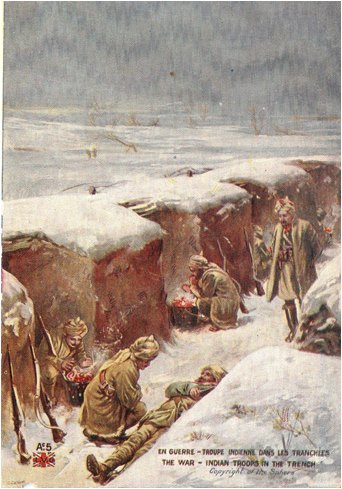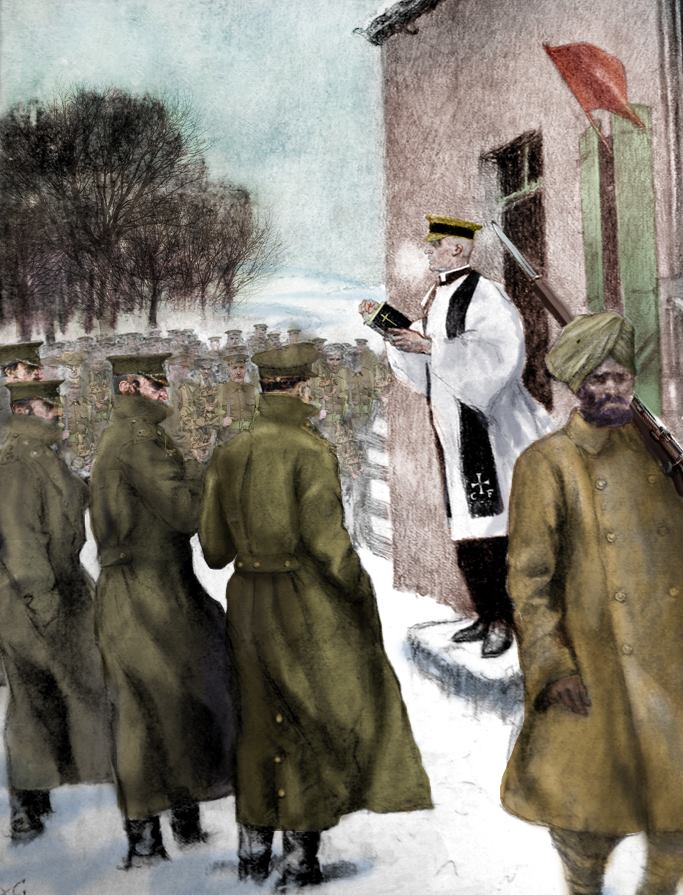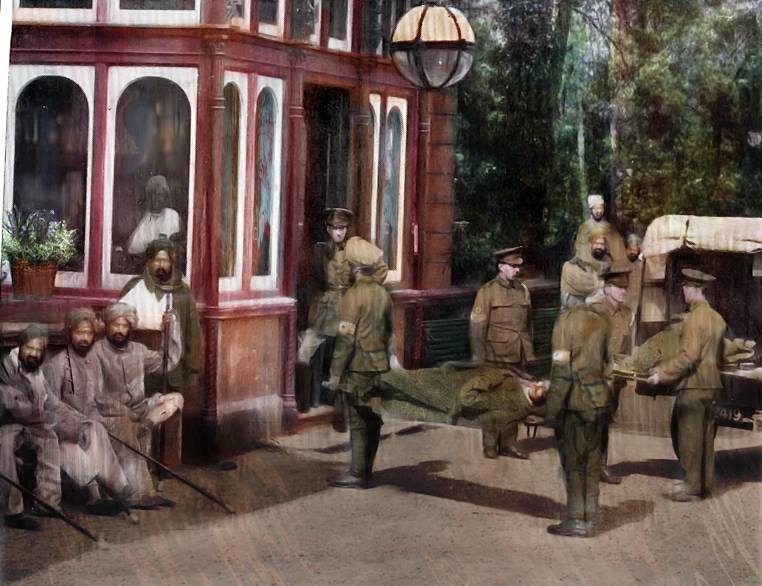
The Calm Before the Storm in Flanders – The 100 year old diary of a DOOMED WW1 SIKH Regiment
The winter of 1914-15 had paralysed an overwhelming German force, entrenching it in a frozen scar across the French & Belgian landscape. While the winter would be hard on everyone, Indian moral remained high as the battered allies glad for the respite settled into a routine of rest, refit and training.
Many regimental war records and dairies provides unique insights into the war, amongst the regiments of the Lahore Division the 47th Sikhs record reveals the moments lost in the stalled warfare of that winter:
War Record 47th Sikhs >
“Christmas Day passed quietly; the distribution of Souvenirs sent by Their Majesties for each man was the main event of the day. Parcels from home provided preoccupation for British Officers”
“On the 26th the G.O.C. Brigade inspected the Regiment at its training work. A reinforcing draft of reservists of our Battalions — 35th and 36th Sikhs – arrived that day, under Waryam Singh from our Depot in India” War Record 47th Sikhs
The 47th Sikhs were a Jat Sikh class regiment, and recruited from the Sikh heartlands of Amritsar, Gurdaspur, Hoshiapur, Jalandhar, Ludhiana. The 35th and 36th likewise were founded as Jalandhar based Jat Sikh regiments in the 1880’s.
War Record 47th Sikhs >
Further drafts joined at ALLOUAGNE. A large one consisted of Captain Storey, Subedar Sundar Singh and 123 I.O.R. of the 35th Sikhs India. Some of our own wounded also rejoined, among these was one contingent of Subedar Thakur Singh (wounded 27th October, 1914), Jemadar Lal Singh 331 I.O.R. Hospitals for Indian wounded had been established both in France and England; to the latter were sent the more severe cases
“The weather continued to be very bad though, wet or fine, cold or warm, training had to be pushed on, we were deprived of the pleasure that a kindlier season would have given us. At the same time, probably owing to the inclement weather, the front line had comparative quiet at this time.”
“Owing to the heavy rain, which continued without intermission, the country wag waterlogged and the trenches full of water. The front line in consequence was held by picquetS posted on such portions of the submerged line as gave a foothold and shelter.”
To save men as far as might be from the effects of continued immersion in co1d water, on being relieved from picquet duty they were marched direct to hot water depots and given hot foot baths, their boots and socks were dried and Vaseline, whale oil, etc., were provided for rubbing into the feet and legs. No such luxuries as trench boots had yet been supplied.
Owing to the mud it was found that rifles were constantly clogging. As a preventive we took to the use of woollen socks pulled on over the breech. These were easily rolled down over the small of the butt when required to fire.
On the 21st a shell burst at the quarter guard at Battalion head— quarters blew the rifle out of the sentry’s hand. He was shocked but otherwise unhurt. The rifle was split in two and is now a souvenir. The enemy she11ed regularly, paying particular attention to the RUE DÜ BOIS the roads in rear. Luckily he worked on a fixed time—table and when the “Hate” began we took cover.
On the 22nd January we were relieved by the 59th Rifles and moved into reserve at RICHEBOURG ST. VAAST. On the 23rd we returned to LACOUTURE on 24th marched with the Brigade to CHOCQUES. En route we passed the Guards in billets and an officer commented on the cleanliness of our rifles in spite of the fact that we had just come from the trenches. Naturally we were pleased with praise from such a source. To earn praise from the Guards on such a matter was something to be proud of.
War Record 47th Sikhs
*The Guards were considered to by many to be the elite of the infantry regiments of the British Army.
War Record 47th Sikhs >
On the 25th we returned to our former billets in ALLOUAGNE. Here we were greeted with a warning order for constant readiness as the 27th January being the German Emperor’s birthday a general attack was anticipated. Nothing, however, came of it. We remained in these billets till 1st February. On the 10th the Regiment marched to the next day moved into Brigade reserve at RICEBOURG ST. VAST. Here we remained till the 17th. The village was shelled daily and on the 15th a 5.9 shell burst in the billets of No. 2 Company causing several casualties. The church tower formed a good aiming mark for the German Gunners. Every night we supplied working parties for the front line. They were employed in strengthening the defences mending barbed wire, etc.
On the 17th we relieved the 59th Rifles in the line, Nos. 3 and 4 Companies in front line, the houses the RUE DU BOIS with picquets as before east of Nos. I and 2 Companies were in local reserve. Weather conditions were no better than before the enemy kept up his monotonous“hates.” All available men were employed by night in improving the defences. This night work, absolutely essential as it was, was one of the most trying features of trench warfare. The enemy were well supplied with Verey lights and kept up a continual though luckily an ill—aimed fire, varied with occasional bursts from machine guns. The latter had to be treated with respect and whatever the state of the ground, hugging it was popular on such occasions.
Patrolling was kept up nightly; a typical Tactical Progress Report dated 2nd February will give some idea of an average night patrol at this period:
“Situation unchanged. Patrols went out between 11.30 p.m. and 4 a.m. Those from the Right Section confirm yesterday’s reports. Left Section report no obstac1e to an advance up to a distance of over 200 yards from our line. At about 250 yards a deep ditch 4—5 feet wide full of mud water runs parallel to our line. This confirms previous reports. An old and useless bridge is in front, of No. 4 Picquet. The ditch is not jumpable in the present state of the ground. On its far side is an enemy ohevaux de frise and beyond this 30—60 yards away are the enemy’s trenches. No enemy picquet located on our front except one on the left of No. 5 Picquet. Enemy heard working on his wire between 9 p.m. and midnight, after which hour no- work was heard.”
“By the end of February, 1915, we had present 335 men who had left India with the Regiment in August 1914. In this number were included men who had been away sick or wounded and who had rejoined. They were now war—hardened veterans, full of confidence in the eventual victory of the British Raj. The vicissitudes of their life in France were taken as a matter of course. Crime was non—existent and cheery good—humour was the prevailing tone. Very few of the original members were to be with the Regiment right through, but it was these original men who set the tone which was to carry through the weary years.”
War Record 47th Sikhs
Britain had declared war on Germany in the defence of Belgium – before the winter had set Indian troops had played a critical role in saving Ypres and the channel Port of Calais from a monstrous German war machine. The letters of Indian soldiers we published in a post last month reflected the glow of that victory in their words, however, by the end of February the storm clouds were clearly gathering.
With the onset of spring, talk amongst the Allies changed from defensive tactics to taking the offensive.
War Record 47th Sikhs >
“On 7th March the regime billeted at LE PETIT PACAUT
and were busy training for offensive operations. For some time the “offensive” had been in the air. Theoretical experts had evolved a scheme whereby we were to break through the German defences in Lines. The first line was to consist of axe men to cut away the barbed wire, following came lines with boards to place across all obstructions and still further lines to carry on. We dug a set of practice German trenches near our billets and duly practiced the performance in full. All who had actual first line experience were long before this convinced that to break through a modern trench line there was only one method, the previous smashing of wire and other defences by Artillery. Luckily for all concerned this view was eventually adopted by higher authority.”
War Record 47th Sikhs
If bitter winter winds had numbed rank & file against the horrors of what had gone before and what was to come – spring would soon rekindle the dormant screams of war.
Check our latest post:
As the Allies unleash the dogs of war on the Western Front in 1915 – more than 1/2 of the first Allied offensive force would be Indian. Read the story here: www.facebook.com/IndusMediaFoundation/posts/671480462980744
Please visit our website www.IMFC.org for more excerpts from the war records and diary of the 47th Sikhs and insights of the Indian WW1 experience of the battlefields of Europe.
#RememberThem
#sikhs #sikh #punjab #punjabi #firstworldwar #ww1 #Indian #GreatWar #1914 #1915 #ww1centennial #indocanadians #indocanadian #canadianhistory #sikhhistory #canadiansikhs #southasians
Illustrations:
- #WW1 Indians in the trenches French Post Card (IMFC.org collection)
- On guard behind the lines in France Newspaper engraving January 1915 (IMFC.org collection)
- Injured Indian soldiers transported to Britain for treatment British WW1 Newspaper (IMFC.org collection)



